A Response to Father Stephen De Young

So then, brethren, stand firm and hold to the traditions which you were taught by us, either by word of mouth or by letter. (2 Thessalonians 2:15; RSV)
Ἄρα οὖν, ἀδελφοί, στήκετε καὶ κρατεῖτε τὰς παραδόσεις ἃς ἐδιδάχθητε εἴτε διὰ λόγου εἴτε δι’ ἐπιστολῆς ἡμῶν. (2 Thessalonians 2:15; NA28)
A reader brought to my attention the 18 October 2021 The Whole Counsel of God podcast by Father Stephen De Young in which he criticized the way certain unnamed Orthodox apologists have used 2 Thessalonians 2:15 to refute the Protestant doctrine of sola scriptura (the Bible alone). As I listened to his comments, I could not help but wonder if he was directing his criticism at me. From time to time, I had used 2 Thessalonians 2:15 to disprove sola scriptura. See my article, “IF NOT SOLA SCRIPTURA, THEN WHAT? The Biblical Basis for Holy Tradition” which was posted in the OrthodoxBridge on 12 June 2011.
What is of interest to us is the section of the podcast that begins at -14:54 and ends at -10:49. [Note: the minus sign is used for marking time when the podcast is in countdown mode.] In this section Father Stephen argues against Orthodox Christians using 2 Thessalonians 2:15 to refute the Protestant doctrine of sola scriptura.
[-14:54] Now, I have to correct my Orthodox friends. [Chuckle] So, this verse gets quoted a lot out of context. Actually, it’s our Roman Catholic friends who started this. Unfortunately, some of our fellow Orthodox Christians have picked up on this. And they use this as a bad argument against sola scriptura. …..
[-14:10] The idea is that they will quote this and say: “Ahh, see look, Paul said they were to hold to tradition whether they were taught by word or by letter. Ahh! See! It’s not just the Bible. It’s some nebulous oral tradition. Right?” That works if you have the Roman Catholic view of Tradition. Which is, there are these things written down in Scripture, and there are these other things, other dogmas, other theological propositions. Right? That are true and just as true as the ones in the Bible but have been passed down orally among the magisterium of the Roman Catholic church since the Apostles. That never got written down until the sixteenth century.
[-13:15] But as Orthodox Christians we don’t accept that view of tradition. That’s problem number one. Our view of Tradition is that Tradition is the life of the Holy Spirit in the life of the Church. That includes in every age what the Holy Spirit is doing in the Church. At the center of Tradition is the Scripture which the Holy Spirit inspires. The Holy Spirit has guarded and protected the handing down of the Scriptures to all generations. That’s at the center of Tradition. There aren’t these two different things for us.
[-12:43] But the bigger problem is that Saint Paul is saying this to the Church at Thessalonica. …. Saint Paul’s letters are letters to churches. They are not theological treatises. They had theological and philosophical treatises in the ancient world. That’s not what Saint Paul wrote. If Saint Paul did write those, we don’t have them and they’re not in the Bible. What we do have are actual letters to actual churches, to actual people to deal with actual problems.
[-12:05] To put it in context here, Saint Paul is saying to these specific people in Thessalonica that they need to hold fast to all the things he taught them whether in person (when he talked to them) or by letter (meaning 1 Thessalonians). That’s what he means by ‘letter.’ He’s not talking about the Scripture. He’s not talking about the Old Testament. He’s talking about 1 Thessalonians. And 2 Thessalonians that they’re reading right now. So, the things I wrote (these two relatively short letters) and all these stuffs I told you while I was there. And these stuffs he told them while he was there, he’s not saying: ‘By the way, tell the next generation of bishops all that stuff. Don’t write it down. And, tell them to tell the next set of bishops and so on.’ He didn’t say any of that here. That’s not what this verse is about. Orthodox Christians hearing this. [-11:06] I don’t want to catch you quoting this verse at our Protestant friends, trying to attack sola scriptura, because that’s not what the verse is about. At all. [Emphasis added.]
There are two notable aspects of what Father Stephen De Young is saying in the passage above. First, he is arguing that the Apostle Paul did not have in mind oral Tradition when he wrote “word of mouth” in 2 Thessalonians 2:15. For Father Stephen, “word of mouth” was a short hand way of referring to what Paul had said to the Thessalonian Christians when he was with them a short time before. Second, Father Stephen is of the opinion that it is inappropriate for Orthodox apologists to use 2 Thessalonians against the Protestant tenet—sola scriptura.
In this article I will be reexamining the passage in its historical and biblical contexts. This will be done by understanding 2 Thessalonians 2:15 against the backdrop of 1 and 2 Thessalonians, and against the social situation described by Luke the Evangelist in Acts 17:1-15. As I review 1 and 2 Thessalonians, I will be looking for clues as to how the Apostle Paul understood the role of oral and written traditions in the early Church. Beyond that, I will be asking whether 1 and 2 Thessalonians support the Protestant doctrine of sola scriptura, or if they lend support to an alternative model of Scripture and Tradition. Because Father Stephen’s objection to the way certain Orthodox apologists used 2 Thessalonians 2:15 is based on his exegesis of the passage, it becomes necessary that we examine the passage in the original Greek. For this article I will be relying on the Nestle-Aland 28th edition found on the Academic-Bible.com website.
In this article I will be making reference to the formal principle of theology. In the 1800s, a distinction was drawn between the formal principle of theology (the authoritative source) and the material principle of theology (the central teachings). These conceptual categories can help us better understand the recent debates between Orthodox and Protestant apologists. For example, the debate over icons is over the material principle of theology (what is believed), whereas the debate over sola scriptura and capital “T” Tradition is over the formal principle of theology (the authority for and source of doctrine). See Philip Schaff’s The Principle of Protestantism, p. 80 and p. 97. [The Wikipedia article “Formal and material principles of theology” has also been included in the Reference section for accessibility.]
The General Context
In comparison with the Apostle Paul’s other letters, 1 and 2 Thessalonians are notable for the warm, affectionate tone the Apostle lavishes on the recent converts in Thessalonica. Luke describes how the Apostle Paul came to Thessalonica during his second missionary journey (Acts 17:1-15). Paul preached in the local Jewish synagogue in Thessalonica on three Sabbaths. His preaching was favorably received, not just by the local Jews, but also by many of the non-Jews and some of the leading citizens there. Enraged by the non-Jews’ favorable response to Paul’s message, the local Jews fomented a public protest that came to the attention of local authorities. This caused Paul and his entourage to move on to the neighboring town of Berea. When the Jews of Thessalonica learned that Paul was making converts in Berea, they headed over to stir up yet another public protest against Paul. This led to Paul being sent to Athens, which was a long way off. It can be inferred that while in Athens Paul was delighted to have the opportunity to present the Good News of Christ to the leading intellectuals of the time, he was also sick with worry about the new Christians in Thessalonica he had left behind so suddenly. Apparently, Paul feared that under pressure from their persecutors, the new converts would forsake the Christian Faith. This concern might have been amplified by Paul’s teaching on the impending apostasy in the last days (2 Thessalonians 2:3). This concern about possible apostasy would explain why Paul described how the Thessalonian Christians “stand fast in the Lord” (ὑμεῖς στήκετε ἐν κυρίῳ) (1 Thessalonians 3:8; RSV, NA28) and why he urged them to “stand firm and hold fast to the traditions” (στήκετε, καὶ κρατεῖτε τὰς παραδόσεις) (2 Thessalonians 2:15; RSV, NA28). In this context, Paul was not concerned with theology but with the spiritual wellbeing of the recent converts.
Another notable aspect of 1 and 2 Thessalonians is the amount of attention given to the end times – the events preceding the Second Coming. Where justification by faith predominated his letter to the Galatians (another early letter by Paul), it seems that questions and rumors about the rise of the Antichrist and the prospect of apostasy were agitating the new converts in Thessalonica. This is an important clue about the pastoral situation the Apostle Paul was addressing when he wrote 1 and 2 Thessalonians.
The Pastoral Context of 2 Thessalonians 2:15
It is important to note that 2 Thessalonians 2:15 opens with the transitional phrase “so then” (ἄρα οὖν). This transitional phrase can also be found in Romans 5:18, 7:8, 7:25, 8:12, 9:16, 9:18, 14:19; Galatians 6:10; Ephesians 2:19; and 1 Thessalonians 5:6. It signals to the reader that verse 15 marks the culmination of a line of thought or argument that Paul has been making. This obliges us to look for the beginning of Paul’s argument that leads to the conclusion in verse 15. Only then can we have a proper understanding of verse 15.
A close reading suggests two possible starting discourse units. One is 2 Thessalonians 2:1-12, in which Paul discusses the end times: the coming of the Antichrist, the Great Apostasy, and the Second Coming of Christ. The other possible starting discourse unit is 2 Thessalonians 2:13-14 in which Paul assures the Thessalonian Christians of their salvation. It suggests that Paul is seeking to allay the Thessalonian Christians’ fear of apostasy by reviewing the Christian message about the end time events then to reassure them of their salvation in Christ. Paul and the early Christians all believed in the imminent return of Christ. Even in his second letter to Timothy, written decades later towards the end of his life, the Apostle Paul warned of the apostasy that would take place in the last days (2 Timothy 3).
Paul’s admonition that the Thessalonian Christians stand firm in the Faith stems from the concern that they might be unsettled by the upheavals of the end time events or by persecution. In 1 Thessalonians 3:2-3, Paul wrote “. . .to establish you in your faith and to exhort you, that no one be moved (σαίνεσθαι) by these afflictions.” Similarly, in 2 Thessalonians 2:2-3 Paul implores the Thessalonian Christians not to be “quickly shaken (σαλευθῆναι) in mind or excited (θροεῖσθαι)” (RSV). The same word can be found in the Olivet Discourse. In this sermon Jesus warns his followers not to be “alarmed” (θροεῖσθε) when they hear about “wars and rumors of wars” (Mark 13:7). This reflects the fact that people who are caught up in eschatology excitement can lose their spiritual bearings. This can result in people abandoning their everyday responsibilities for end times speculation or even ceasing to work. This probably accounts for the Apostle Paul’s strong words directed at freeloading Christians in 2 Thessalonians 3:6-13.
2 Thessalonians 2:15 complements and roughly parallels 2 Thessalonians 2:2. First, in verse 2:2, Paul is concerned about the Thessalonian Christians’ spiritual wellbeing. He worries about their being “shaken” (σαλευθῆναι) by some oral report (λόγου) that the Second Coming had already taken place. This explains why in verse 2:15, he admonishes the Thessalonian Christians to “stand firm” (στήκετε) in spirit and to “hold fast” (κρατεῖτε) to “the traditions” (τὰς παραδόσεις) he taught them. To “stand firm” refers to the state of their hearts and to “hold fast” refers to their adherence to Paul’s teachings. Second, in verse 2:2 Paul describes the means of communication for learning about the end times: (1) a letter (ἐπιστολῆς) purportedly from Paul, (2) a spoken word (λόγου) allegedly said by Paul, or (3) a prophetic utterance (πνεύματος). The presence of the charismatic gift of prophecy is evident in light of Paul’s admonition that prophetic utterances were not to be despised but rather tested (1 Thessalonians 5:20-21). The gift of prophecy was fairly common in the New Testament Church (see 1 Corinthians 12 and 14, Romans 12, Ephesians 4, Acts 21). In verse 15, Paul refers again to the two primary means of communication: letter (ἐπιστολῆς) and word of mouth (λόγου). If the Apostle Paul intended verse 15 to parallel verse 2, then we can expect the meaning for “word” (λόγου) to be symmetrical for both verses. That Paul used “word of mouth” in tandem with “letter” suggests that both were valid and authoritative means of communicating divine revelation. Paul did not exclude oral communications, nor did he subordinate the oral word to the written word; doing either of these would be suggestive of the Protestant sola scriptura paradigm. Paul’s placement of the oral word alongside the written word suggests the Orthodox paradigm of capital “T” Tradition comprising written Tradition with oral Tradition. This understanding of two complementary halves of one singular Tradition diverges from the Roman Catholic paradigm which sees Tradition as two streams from one divine source (see Dei Verbum §9).
There are pastoral implications to 2 Thessalonians 2:15. One is that Tradition (written and oral) provides a spiritual, doctrinal, and ethical foundation for the Christian life. If we stand firm and hold fast to Tradition, our lives will be marked by stability and sobriety instead of wavering and excitability. This verse is especially pertinent for modern-day Evangelicals and Dispensationalists who obsess about the Rapture and the End Times. It should also be noted that Paul makes no mention of seeking a revelation by the Holy Spirit. Private revelations are much more prone to fickle subjectivity than the stable foundation provided by Tradition (written and oral). In other words, when modern-day Protestants and Orthodox Christians read 2 Thessalonians 2:15, they should keep in mind that Paul’s primary concern was pastoral, not theological apologetics. So, while 2 Thessalonians 2:15 does give us important insights into the formal principle of Paul’s theology, present-day Christians should beware reading the verse solely from the standpoint of doing apologetics. This I believe was the intent behind Fr. Stephen’s criticism of Orthodox apologists.
So, while 1 and 2 Thessalonians are primarily pastoral in nature, they contain useful information regarding faith and practice. The challenge for us here is not to succumb to proof texting but to listen attentively to the biblical text and discern the underlying theological principle. Paul wrote: “All scripture is inspired by God and profitable for teaching . . . .” (2 Timothy 3:16)
The Traditioning Process in 1 and 2 Thessalonians
Paul used a wide range of words to describe the traditioning process in 1 and 2 Thessalonians: δίδωμι (didōmi) (to give, entrust), παραδίδωμι (paradidōmi) (to hand over, give over, deliver, pass on), διδάσκω (didaskō) (to teach), γνωρίζω (gnōrizō) (to make known, disclose), παραγγέλλω (paraggellō) (to command, order) (Morris p. 240). Paul’s reference to Apostolic tradition in 2 Thessalonians was not accidental but reflects an important aspect of his apostolic ministry. Paul referred to the traditioning process in his other letters (cf. 1 Corinthians 11:2, 23; 1 Corinthians 15:1-3; 2 Timothy 2:2). When I was a Protestant, I would gloss over Paul’s use of the words: tradition, receive, pass on, and hold fast as mere linguistic quirks. However, when I began to study early Church history and the Church Fathers, I began to appreciate the major role the traditioning process played in Paul’s apostolic ministry. I became more receptive to there being an oral Apostolic Tradition complementing written Apostolic Tradition. I also became painfully aware of the paucity of evidence for sola scriptura. This led to my writing “IF NOT SOLA SCRIPTURA, THEN WHAT? The Biblical Basis for Holy Tradition.” In the article I show that early Christian doctrine was something received from the apostles and their disciples, that is, through the traditioning process. Protestantism’s sola scriptura assumes that the Bible possesses a unique authority and can be understood apart from the Church. My argument is that the Church (the covenant community) is the custodian of Scripture (the covenant document), which must be interpreted by those who have received the covenant authority to expound on the meaning of Scripture. In other words, Scripture cannot be understood apart from the Apostolic Church which stands in continuity with the Apostles the source of Tradition (Written and Oral).
One of the key questions in recent Protestant-Orthodox dialogue pertains to the formal principle of theology. What best describes the formal principle of the Apostle Paul’s theology? To be more specific: Did Paul teach Scripture (written Tradition) comprising a unique authoritative source for Christian belief and practice (the Protestant understanding)? Or did he teach Oral Tradition as an authoritative source for Christian belief and practice comparable to written Tradition (the Orthodox understanding)? The answer to these questions has significant implications for Christians today, especially if they believe that their theology and theological methods ought to align with that of the Apostle Paul.

Oral Tradition – Paul Preaching in Athens
The Authority of the Apostle Paul’s Oral Instructions
One source of the Apostle Paul’s theology is the Good News (εὐαγγέλιον). When Paul evangelized, he was announcing the coming of the kingdom of God and inviting his listeners to enter into a covenant relationship with Christ. In this context we can see why Paul referred to the Good News as the “word of God” (λόγον θεοῦ) (1 Thessalonians 2:13). As the agent of the New Covenant, Paul’s spoken word carries the weight of divine authority. That he was referring to his spoken words can be seen in the phrase: “which you heard from us.”
And we also thank God constantly for this, that when you received (παραλαβόντες) the word of God which you heard from us, you accepted it not as the word of men but as what is really is, the word of God, which is at work in you believers. (1 Thessalonians 2:13; RSV; emphasis added)
Also noteworthy is the fact that Paul makes reference to the traditioning process in the use of the phrase “you received” (παραλαβόντες). In my 2011 OrthodoxBridge article, I noted that biblical support for the traditioning process can be found in the use of words such as “passed on” (παρέδωκα) and “receive” (κατέχω) (see 1 Corinthians 11:2). This is an important clue to the Apostle Paul’s formal principle of theology.
For Paul, it was not just his kerygmatic proclamation of the Good News that was endued with divine authority but also his pastoral instructions on the Christian way of life.
For you know what instructions (παραγγελίας) we gave (ἐδώκαμεν) you through the Lord Jesus. For this is the will of God, your sanctification: that you abstain from unchastity; that each one of you know how to take a wife for himself in holiness and honor, not in the passion of lust like the heathen who do not know God; that no man transgress, and wrong his brother in this matter, because the Lord is an avenger in all these things, as we solemnly forewarned you. For God has not called us for uncleanness, but in holiness. Therefore whoever disregards this instruction, [παραγγελίας], disregards not man but God, who gives his Holy Spirit to you. (1 Thessalonians 4:2-8; RSV; emphasis added)
The phrase in verse 2 “through the Lord Jesus” is another indicator that Paul was conscious of the fact that he spoke on behalf of the Risen Lord, that is, with divine authority. Jesus in the Great Commission passage affirmed his divine authority: “All authority in heaven and on earth has been given to me” (Matthew 28:18) before authorizing his Apostles to go into all the world to teach the nations. See also, “He who hears you hears me. . . .” (Luke 10:16; RSV) which implies that the spoken word of an Apostle can be invested with divine authority. When the Apostles went into all the world, they taught with divine authority being representatives of Jesus Christ. Both their spoken words and their written words possessed divine authority.
The Authority of the Apostle Paul’s Letters
The importance that the Apostle Paul gives to his letters can be seen in his closing instruction to 1 Thessalonians that the letter be read to all the brethren (1 Thessalonians 5:27). The letter was not a private communication, nor was it meant for a particular group, but to the entire Christian community in Thessalonica. One way to interpret this instruction was that it was to be read out loud at the weekly Eucharistic celebration.
Towards the end of 2 Thessalonians, Paul makes it clear that he expects his instruction about all Christians earning their living to be obeyed (3:14). “If anyone refuses to obey what we say in this letter. . . .” (RSV) The weightiness of this injunction stems from the divine authority behind his apostolic office. He writes in 3:6: “Now we command you, brethren, in the name of the Lord Jesus Christ . . . .” The phrase “in the name of the Lord Jesus Christ,” is not mere decorative pious prose, but equivalent to the Old Testament prophet’s “Thus says the Lord.”
A review of 1 and 2 Thessalonians shows that Paul did not use the term “Scripture” (τῶν γραφῶν). One could expect to find Paul referring to the Scriptures in light of his reliance on the Jewish Scripture in his missionary outreach in Acts 17:1-15. What we do find are three instances of Paul using the related verb “γράφω” (write). The Apostle Paul in two different places in 1 Thessalonians noted that there was no need for him to write to them about love for the brethren (4:9) or about the end times (times and seasons) (5:1). This indicates that the Apostle Paul would not hesitate to commit his thoughts to writing if the need arose. Apparently, in the early days of Paul’s apostolic ministry there was no conscious effort to create a new set of Scripture. It would only be years later that Paul’s letter would be accorded the status of Scripture (see 2 Peter 3:16-17).
2 Thessalonians 2:15 sheds important light about on the Apostle Paul’s theological method. We learn that the Apostle Paul was of the opinion that both his spoken word and his written word were endued with divine authority. This points to Paul’s formal principle consisting of Scripture with Oral Tradition.
The Formal Principle of the Early Church
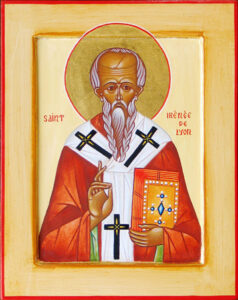
Icon of St. Irenaeus of Lyons
If Saint Paul’s formal principle of theology consisted of Scripture with Oral Tradition, we can expect that the early Church held to a similar approach. One early evidence for Tradition as the formal principle of the early Church can be found in Irenaeus of Lyons who lived in the second century. He writes:
The Church, though dispersed throughout the whole world, even to the ends of the earth, has received from the apostles and their disciples this faith: [She believes] in one God, the Father Almighty, Maker of heaven, and earth, and the sea, and all things that are in them. . . . (Against Heresies 1.10.1; ANF vol. 1, p. 330; emphasis added)
Here we see a very early creed that bears a striking resemblance to the Nicene Creed. This is not some “nebulous oral tradition” as Father Stephen alleged Roman Catholics hold to, but a well-crafted theological system. The phrase “received from the apostles and their disciples” refer to the traditioning process in the early Church. If sola scriptura had been the theological method, we would see something along the lines of “according to the Bible, God’s inspired word, we believe . . . .”
Irenaeus explicitly affirms Tradition as the Church’s formal principle in his account of his debates with the Gnostic heretics.
But again, when we refer them to that tradition which originates from the apostles, [and] which is preserved by means of the successions of presbyters in the Churches, they object to tradition, saying that they themselves are wiser not merely than the presbyters, but even than the apostles, because they have discovered the unadulterated truth. (Against Heresies 3.2.1; ANF vol. 1, p. 415; see also Book 5 preface, p. 526; emphasis added)
For Irenaeus, Tradition is not some vague, mysterious phenomenon but an identifiable body of teachings found in the public office of the bishops.
It is within the power of all, therefore, in every Church, who may wish to see the truth, to contemplate clearly the tradition of the apostles manifested throughout the whole world; and we are in a position to reckon up those who were by the apostles instituted bishops in the Churches, and [to demonstrate] the succession of these men to our own times. . . . (Against Heresies 3.3.1; ANF vol. 1, p. 415; emphasis added)
Irenaeus’ reference to the succession of bishops from the Apostles to his time points to the Apostle Paul’s instructions in 2 Timothy 2:2 regarding the ordaining of clergy. The Christian Faith was transmitted by the Apostles to subsequent generations via the succession of bishops. This is a process familiar to Orthodoxy, but not to Protestantism (Anglicanism being the exception). Protestantism with its commitment to sola scriptura has denigrated the office of the bishop as the bearer or Apostolic Tradition.
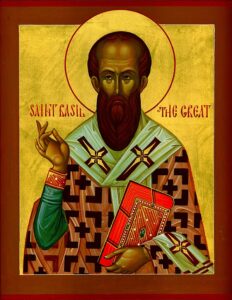
Basil the Great
Another instructive source is Basil the Great’s On the Holy Spirit in which he describes Tradition as the faith and practice received from the Apostles and handed down via the bishops.
Of the beliefs and practice whether generally accepted or publicly enjoined which are preserved in the Church some we possess derived from written teaching; others we have received delivered to us “in a mystery” by the tradition of the apostles; and both of these in relation to true religion have the same force. (On the Holy Spirit chapter 27 §66; NPNF vol. 8 pp. 40-41; emphasis added)
Chapter 27 is especially significant because here Basil lists and describes in detail oral Tradition in the fourth century. He lists practices which may seem strange to many Protestants and Evangelicals but are very familiar to present-day Orthodox: making the sign of the cross, facing east during liturgical prayers (ad orientem), the Eucharistic prayer, threefold baptism, etc. The specificity with which Irenaeus and Basil described Unwritten Tradition stands in contrast to Father Stephen’s more nebulous and mystical understanding of Tradition as the “life of the Holy Spirit in the life of the Church.”
A better description of Holy Tradition can be found in Kallistos Ware’s The Orthodox Church. In this highly regarded work Metropolitan Ware describes Tradition as the beliefs and practices Christ imparted to the Apostles (p. 196). Ware then goes on to describe the relations between Written and Oral Tradition.
Note that the Bible forms a part of Tradition. Sometimes Tradition is defined as the oral teachings of Christ, not recorded in writing by His immediate disciples. Not only non-Orthodox but many Orthodox writers have adopted this way of speaking, treating Scripture and Tradition as two different things, two distinct sources of the Christian faith. But in reality there is only one source, since Scripture exists within Tradition. To separate and contrast the two is to impoverish the idea of both alike (pp. 196-197; emphasis added).
After discussing the complementary relations between Written and Oral Tradition, Ware goes on to note that for the Orthodox Church Tradition is not static but a dynamic reality.
Tradition is not only kept by the Church – it lives in the Church, it is the life of the Holy Spirit in the Church (p. 198).
As I reviewed Fr. Stephen’s description of Holy Tradition, I find that he downplayed Tradition as beliefs and practices and overemphasized Tradition as the Holy Spirit’s indwelling presence in the Church. I understand that he was under considerable time constraint due to his giving a podcast presentation, however, Fr. Stephen created a straw man argument. As Metropolitan Ware notes, Tradition is both a set of definable beliefs and practices, and the indwelling presence of the Holy Spirit in the Church. The point being that there are justifiable grounds for Orthodox apologists to present and defend Oral Tradition as the beliefs and practices handed down by the Apostles.
The distinction between Written and Unwritten Tradition is subtle and can lead to different understandings even among the Orthodox. Fr. Stephen suggests that Scripture is at the center of tradition and the rest flows out of it, allowing for customs that are “beside” but not contradictory (e.g., signing the cross, praying to the east, icons, etc.). While I am in substantial agreement with this position, I am of the understanding that there was an implicit understanding of the meaning of Scripture (Oral Tradition) that accompanied the physical handing over of Scripture in the ordination ceremony. Authorial intent is situated not just in the text (the Bible) but also in the duly authorized readers of the text (the successors to the Apostles, i.e., the bishops). In Orthodoxy, Oral Tradition possesses parity with Scripture. If Oral Tradition is derived from Scripture, then the implication is that the authority of Oral Tradition is derivative of Scripture and not independent of Scripture. Taken to extremes this can lead to Protestantism’s sola scriptura.
What the Commentaries Say about 2 Thessalonians 2:15
An examination of bible commentaries across religious traditions can provide us with interesting insights on 2 Thessalonians 2:15 as well as the hermeneutical bias of those commenting on the text. Below are several commentaries from Protestant and Orthodox sources.
The NIV Study Bible’s commentary note on 2 Thessalonians 2:15 reflects the point of view of low church Evangelicalism. This bias can be seen its rendering the Greek word παράδοσις (paradosis) as “teachings” instead of “traditions.” In the commentary note for the NIV Study Bible we find:
Until the NT was written, essential Christian teaching was passed on in the ‘traditions,’ just as rabbinic law was (see note on Mt 15:2); it could be either oral or written. (Emphasis added.)
The phrase “until the NT was written” is not based on the biblical text but on a Protestant understanding of church history. This is the belief that originally the Christian message consisted of a mixture of oral and written traditions, then when the New Testament canon was finalized, oral tradition fell into disuse or was relegated to a secondary status. The problem with this assumption is that there is no evidence in the writings of the Church Fathers or other ancient sources of such a shift taking place.
In the RSV, preferred among mainline Protestants, we find paradosis translated as “traditions.” The commentary footnote to 2 Thessalonians 2:15 in The New Oxford Annotated Bible—An Ecumenical Study Bible takes a more neutral posture noting:
The traditions would involve doctrinal, moral, and liturgical teaching, as 1 Corinthians show (italics in original text).
Historically, low church Evangelicals are much more hostile to tradition in comparison to mainline Protestantism and the magisterial Reformers.
An important concession to the Orthodox understanding can be found in the Protestant commentator Leon Morris. He notes:
He puts no difference between the authority of the written and the spoken word. Both alike were in very deed the word of God, as we see from 1 Thess. 2:13 and 1 Cor. 14:37 (p. 240; emphasis added).
By accepting that for the Apostle Paul both his written and his oral communications were divinely authoritative, Morris acknowledged something akin to the Orthodox position. In other words, in the New Testament Church there was no indication of the sola scriptura paradigm in which written tradition was distinct from and superior to oral tradition as both alike were the word of God.
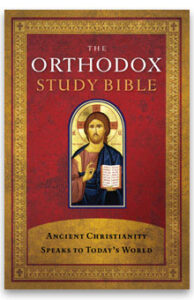
The Orthodox Study Bible is an important source because it reflects the general Orthodox understanding and because it carries the approval of the bishops. The Orthodox Study Bible commentary note to 2 Thessalonians 2:15 states that there are two kinds of traditions: the tradition of men and the tradition of the apostles or “Holy Tradition.” It notes that God is the source of apostolic tradition. Holy Tradition is that which Christ taught the Apostles and which the Apostles taught the Church under the inspiration of the Holy Spirit when visiting the local churches or in their writings. The closing sentence to the commentary note presents the Orthodox Church’s understanding of Holy Tradition.
Under the guidance of the Holy Spirit we adhere to Holy Tradition as it is present in the apostles’ writings and as it is resident in the Church to which the truth is promised (Jn 16:13).
In this sentence we find an affirmation of Holy Tradition existing in two modes, written and unwritten. The first mode—the apostles’ writings—is easily identifiable, but the second mode is more nebulous— “as it is resident in the Church to which the truth is promised.” This fuzziness can be seen as pointing away from unwritten tradition as a distinct corpus of doctrines and practices transmitted solely among the upper echelons of the ordained clergy. This to me opens the way for understanding unwritten tradition as (1) the implicit understanding of the meaning of the written text transmitted from one generation of clergy to the next and (2) the clarification and elaboration of church doctrine and practice in church history. What is notable about this commentary note is that the editors did not seek to identify with precision the contents or parameters of unwritten tradition.
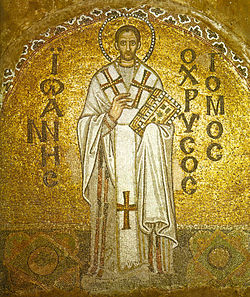
Icon: St. John Chrysostom
The fourth-century Church Father, John Chrysostom, holds to a dual-source understanding of Tradition. In his Homilies on Thessalonians (NPNF Vol. 13 p. 390) he writes:
Hence it is manifest, that they did not deliver all things by Epistle, but many things also unwritten, and in like manner both the one and the other are worthy of credit. Therefore let us think the tradition of the Church also worthy of credit. It is a tradition, seek no further. (NPNF Vol. 13)
In this passage, John Chrysostom makes two points: (1) the Apostles did not deliver all things via written Tradition (Scripture) and (2) Tradition, which was both written and unwritten (oral), both modes were “worthy of credit.” For Chrysostom: (1) written tradition does not stand over unwritten tradition and (2) unwritten tradition is equally authoritative as written tradition. This puts him at odds with Protestantism’s sola scriptura. Chrysostom’s observation that the Apostles “did not deliver all things by Epistle,” puts him at odds with the Protestant doctrine of the sufficiency of Scripture. It is clear that John Chrysostom, one of the great Church Fathers, supports Orthodoxy’s formal principle of Holy Tradition than Protestantism’s formal principle of sola scriptura.
Occam’s Razor and 2 Thessalonians 2:15
Father Stephen is of the opinion that in 2 Thessalonians 2:15 the Apostle Paul was simply urging the Christians in Thessalonica to hold fast to his teachings whether in the letters they currently had in their hands or to his oral teachings when he was physically present with them earlier. In other words, he suggests that enthusiastic Orthodox apologists have amplified a simple prosaic remark into an argument against sola scriptura which had yet to appear on the scene. From the standpoint of the philosophical principle Occam’s Razor—that all things being equal, the simpler explanation is to be preferred over more elaborate ones. In other words, Father Stephen’s prosaic reading of 2 Thessalonians 2:15 is to be preferred over the more elaborate theological readings that had been used to argue against sola scriptura. However, the simpler solution is not always the best. Father Stephen’s prosaic reading of 2 Thessalonians 2:15 falters in the face of the counterevidence: (1) the Apostle Paul’s oral teachings possessed divine authority equal to that of his written teachings, (2) while Paul’s letters were not formal theological treatises, they have been used as theological resources by Christians across traditions, and (3) 2 Thessalonians 2:15 shed valuable light on the formal principle of early Christianity as corroborated by the Church Fathers.
2 Thessalonians 2:15 in Early Christian Apologetics
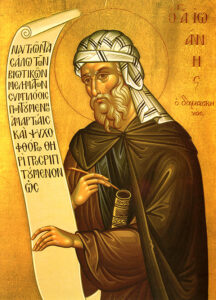
John of Damascus
For Orthodox Christians, the Church Fathers play an important role in how we read Scripture. For this present discussion, the question is: Did any of the Church Fathers understood 2 Thessalonians 2:15 as supporting the notion of oral Tradition? One example of this is John of Damascus. In his Exposition on the Christian Faith, he cites two bible passages—2 Thessalonians 2:15 and 1 Corinthians 11:2—in support of oral Tradition.
Moreover that the Apostles handed down much that was unwritten, Paul, the Apostle of the Gentiles, tells us in these words: Therefore, brethren, stand fast and hold the traditions which ye have been taught of us, whether by word or by epistle. And to the Corinthians he writes, Now I praise you, brethren, that ye remember me in all things, and keep the traditions as I have delivered them to you. (Exposition of the Orthodox Faith chapter 16 ‘Concerning Images’; NPNF vol. 9 p. 88; emphasis added; see also New Advent Book IV Chapter 16)
The phrase “handed down” indicates that John of Damascus was referring to Tradition. It is interesting that he used Written Tradition to support Oral Tradition. Another interesting fact is that he claimed that much of Tradition was unwritten, which suggest that Oral Tradition was not some minor add on but provides a broader, general context from which the Church understood Written Tradition.
Another Church Father who cited 2 Thessalonians 2:15 in defense of unwritten Tradition is Basil the Great. Saint Basil was embroiled in a controversy over the prayers used in the Liturgy—more specifically, the Trinitarian formula used at the end of the Litany. His opponents, the Semi-Arians who questioned and even denied the divinity of the Holy Spirit, in a strategy much like Protestants, argued that the Trinitarian ending had no basis in Scripture.
In answer to the objection that the doxology in the form “with the Spirit” has no written authority, we maintain that if there is no other instance of that which is unwritten, then this must not be received. But if the greater number of our mysteries are admitted into our constitution without written authority, then, in company with the many others, let us receive this one. (On the Holy Spirit, chapter 29; NPNF vol. 8 p. 45; emphasis added)
Basically, the Semi-Arians were arguing that the doxological formula “with the Spirit,” has no biblical backing and therefore ought not to be used in the liturgical prayers in Sunday worship. Basil’s rejoinder was that the inclusion of “with the Spirit” was part of the Church’s unwritten Tradition. One cannot but be struck by the certitude with which Saint Basil invokes the authority of unwritten Tradition. He writes:
For I hold it apostolic to abide also by the unwritten traditions. “I praise you,” it is said, “that ye remember me in all things, and keep the ordinances as I delivered them to you;” [1 Cor. 11:2] and “Hold fast the traditions which ye have been taught whether by word, or our Epistle.” [2 Thess. 2:15] One of these traditions is the practice which is now before us, which they who ordained from the beginning, rooted firmly in the churches, delivering it to their successors, and its use through long custom advances pace by pace with time. (Chapter 29; NPNF vol. 8 p. 45; emphasis added).
Saint Basil’s On the Holy Spirit has been frequently cited for his detailed list of examples of unwritten Tradition (see chapter 27). So, it should come as no surprise that he would use 2 Thessalonians 2:15 in defense of unwritten Tradition.
In conclusion, the controversy over oral Tradition versus written Tradition is not new. John of Damascus had to deal with the issue in the eighth century. Basil the Great defended oral Tradition in the fourth century. The controversy can be found as early as the second century in the writings of Irenaeus of Lyons. The controversy over oral Tradition versus written Tradition continues on into the twenty-first century. Thus, it can be said that citing 2 Thessalonians 2:15 in defense of Oral Tradition is not a recent innovation by Orthodox apologists. By citing 2 Thessalonians 2:15 in defense of Oral Tradition, present-day Orthodox apologists are following in the footsteps of the early Orthodox apologists: Irenaeus of Lyons, Basil the Great, and John of Damascus. In light of this, I respectfully ask that Father Stephen De Young reconsider the criticism he made in his 18 October 2021 podcast of Orthodox apologists who cite 2 Thessalonians when discussing sola scriptura with Protestants.
The current debate between Protestantism’s sola scriptura and Orthodoxy’s capital “T” Tradition presents an opportunity for Orthodox Christians to present the ancient Faith to inquiring Protestants and Evangelicals. Broad sweeping caricatures on both sides are not helpful and can even be harmful to the current conversation. The present dialogue between Protestants and Orthodox can be enriched with careful scholarship combined with the spirit of charity and courtesy. This is the path of true Christian apologetics.
Robert Arakaki
References
Robert Arakaki. “IF NOT SOLA SCRIPTURA THEN WHAT? The Biblical Basis for Holy Tradition.” Contra Sola Scriptura (Part 2 of 4). OrthodoxBridge, 12 June 2011.
Robert Arakaki. “Calvin Dissing the Fathers.” OrthodoxBridge, 10 November 2013.
Basil the Great. On the Holy Spirit. St. Vladimir’s Seminary Press.
Basil the Great. On the Holy Spirit. NPNF Vol. 8. Wm. B. Eerdmans Publishing Co.
John Chrysostom. “Homily IV.” Homilies on Thessalonians, pp. 388-392. NPNF Vol. 13.
John of Damascus. Book 4 Chapter 16 “Concerning Images.” In Exposition of the Orthodox Faith, p. 88. NPNF Vol. 9. Wm. B. Eerdmans Publishing Co.
Leon Morris. The First and Second Epistles to the Thessalonians. The New International Commentary on the New Testament. F.F. Bruce, General Editor. Wm. B. Eerdmans Publishing Company.
Pope Paul VI. Verbum Dei. 18 November 1965.
Philip Schaff. The Principle of Protestantism. Lancaster Series on the Mercersburg Theology, Bard Thompson and George H. Bricker, editors. Philadelphia: United Church Press.
Wikipedia. “Formal and material principles of theology.”
Fr. Stephen De Young. “2 Thessalonians, Chapters 2 and 3.” [33:07] The Whole Counsel of God | Ancient Faith Ministries, 18 October 2021.


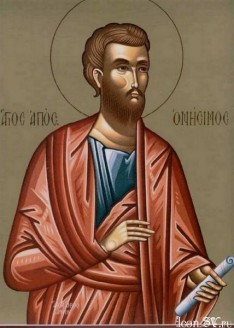

Recent Comments